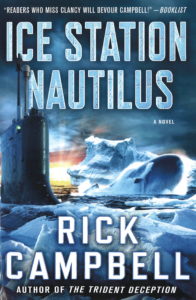 By Rick Campbell, St. Martin’s Press, New York, NY (2016)
By Rick Campbell, St. Martin’s Press, New York, NY (2016)
Reviewed by William H. White
A gripping, action-packed novel that is just plausible enough to be pulled from the headlines of today’s paper. Commander Campbell, a former submariner, knows his submarines and the technology they use to fulfill their assignments; his apparent knowledge, whether first-hand or not, of the Arctic and under-ice operations seems deep and helps make his tale all the more credible. At the same time, his technical savvy detracts at times from his story.
His use of technical jargon and naval anagrams, abbreviations, and repetitive operational commands make the reader want to shout out, “Roger that! Enough with the jargon; we got it!” But on it goes throughout the book. While I recognize that I was provided an “advance, uncorrected proof,” there were quite a few errors – not the missing punctuation or typo errors one might expect shortly before publication, but the use of wrong words and improper tenses; example: “grinded” vs “ground.” I hope they are corrected by one of the excellent editors at St. Martin’s Press as that type of issue seems to jump off the page at a reader.
A further issue I had with his tale involves SEAL Team swimmers wearing wetsuits while exiting a submarine under the ice in the Arctic. I would think drysuits would have been more appropriate in the 29-degree water.
The story involves a collision between the US and Russian submarines under the icecap, the subsequent rescue operation by both countries, and includes several sub-plots involving nefarious Russian military types trying to sabotage both their ship and the American one as well as the American rescue effort. It is credible in that there have been issues in the past between Soviet and US subs resulting in tragedy when one skipper or another gets a bit too aggressive.
The story – at least the part taking place on the icecap – puts one in the mind of the 1963 Alistair MacClean story, Ice Station Zebra, updated to today’s technology. Nonetheless, it is a fast read, a page turner filled with one disaster after another. Campbell’s ability to conjure up new life-threatening situations is seemingly endless and makes the reader wonder with each new scenario, “What’s next for these poor guys stuck under the ice?” And it appears that the rescue teams on the ice will fair little better.
Sadly, Commander Campbell is more wrapped up in delivering a rip-snorting story than he is in developing his characters; I found that I cared little about them and found them mostly indistinguishable one from another (gender notwithstanding). There seemed little effort spent in creating more than cardboard cutouts to carry out the actions designed to advance the story.
While Ice Station Nautilus was a fun and fast read, it could have been much more. I think Commander Campbell has provided a thriller which will satisfy many aficionados of the action-adventure genre.
White is an accomplished fictional writer of the early 19th century and member of the Foundation’s Holloway Society.

